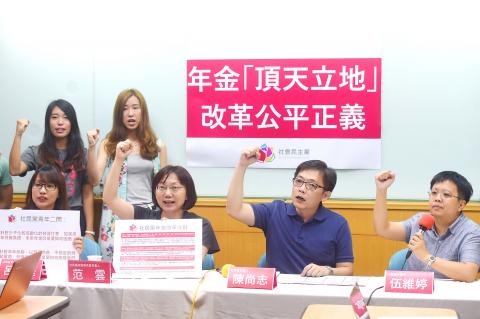National pension reform should consolidate different pension funds while guaranteeing minimum living expenses and putting a ceiling on payouts, the Social Democratic Party (SDP) said yesterday, announcing its pension reform plans as a national debate continues.
“It is time to stop the war of words, because we all have our ‘saliva’ on the subject. Anyone who is serious about supporting reform should put forth their plan,” SDP policy committee convener Fan Yun (范雲) said.
Fan criticized the organizers of Saturday’s protest by retired public-school teachers, civil servants and military personnel for stating that they support pension reform, while focusing on the “non-issue” of “dignity” instead of outlining specific proposals.

Photo: Chien Jung-fong, Taipei Times
“The problem with pensions is that the difference across occupations is too huge, which is what creates hostility. Pension funds are going bankrupt because they are tied too closely to salaries rather than providing a minimum guarantee for retirees,” she said.
SDP convener Chen Shang-chih (陳尚志) said that national pension fund statistics show that spending is an inverse pyramid, with the 260,000 pensioners with monthly benefits of more than NT$40,000 accounting for more than double the spending on any other bracket, while 1.39 million retirees with benefits of less than NT$5,000 account for less than any other bracket.
“How can you expect someone to live on less than NT$10,000 [a month]?” Chen said, calling for a universal pension equal to basic living expenses to guarantee dignity for the elderly.
Based on 60 percent of average national spending per person, national basic living expenses are equal to about NT$12,000 a month, he said, adding that the government could provide all of the nation’s 3.3 million retirees with an NT$11,795 monthly pension if it were to allocate pension spending equally.
Fan added that the SDP’s plan would include a relative or absolute cap on benefits, citing both a possible 60 percent “replacement ratio” cap relative to salaries and an absolute cap equal to the average national wage.
“If you want to earn a larger pension, you can always invest in private insurance, but the government should not have to make that kind of guarantee,” Fan said, adding that the party’s plan would also eliminate the 18 percent interest rate accounts of former government employees.
Vice President Chen Chien-jen (陳建仁), who chairs the Pension Reform Commission which President Tsai Ing-wen (蔡英文) has charged with drafting new legislation, said last week that retired public-school and university teachers receive average monthly pensions of NT$68,025, retired civil servants receive NT$56,383 and military personnel receive NT$49,379.
In comparison, retired blue-collar workers (including most salaried private-sector workers) receive average monthly pensions of NT$16,179 from their Labor Insurance, while farmers receive an average of NT$17,223.
Those who receive a national pension, which serves as the de facto baseline pension for people such as the long-term unemployed who are excluded from other funds, receive an average of NT$3,628 a month.

Alain Robert, known as the "French Spider-Man," praised Alex Honnold as exceptionally well-prepared after the US climber completed a free solo ascent of Taipei 101 yesterday. Robert said Honnold's ascent of the 508m-tall skyscraper in just more than one-and-a-half hours without using safety ropes or equipment was a remarkable achievement. "This is my life," he said in an interview conducted in French, adding that he liked the feeling of being "on the edge of danger." The 63-year-old Frenchman climbed Taipei 101 using ropes in December 2004, taking about four hours to reach the top. On a one-to-10 scale of difficulty, Robert said Taipei 101

Nipah virus infection is to be officially listed as a category 5 notifiable infectious disease in Taiwan in March, while clinical treatment guidelines are being formulated, the Centers for Disease Control (CDC) said yesterday. With Nipah infections being reported in other countries and considering its relatively high fatality rate, the centers on Jan. 16 announced that it would be listed as a notifiable infectious disease to bolster the nation’s systematic early warning system and increase public awareness, the CDC said. Bangladesh reported four fatal cases last year in separate districts, with three linked to raw date palm sap consumption, CDC Epidemic Intelligence

Two Taiwanese prosecutors were questioned by Chinese security personnel at their hotel during a trip to China’s Henan Province this month, the Mainland Affairs Council (MAC) said yesterday. The officers had personal information on the prosecutors, including “when they were assigned to their posts, their work locations and job titles,” MAC Deputy Minister and spokesman Liang Wen-chieh (梁文傑) said. On top of asking about their agencies and positions, the officers also questioned the prosecutors about the Cross-Strait Joint Crime-Fighting and Judicial Mutual Assistance Agreement, a pact that serves as the framework for Taiwan-China cooperation on combating crime and providing judicial assistance, Liang

US climber Alex Honnold left Taiwan this morning a day after completing a free-solo ascent of Taipei 101, a feat that drew cheers from onlookers and gained widespread international attention. Honnold yesterday scaled the 101-story skyscraper without a rope or safety harness. The climb — the highest urban free-solo ascent ever attempted — took just more than 90 minutes and was streamed live on Netflix. It was covered by major international news outlets including CNN, the New York Times, the Guardian and the Wall Street Journal. As Honnold prepared to leave Taiwan today, he attracted a crowd when he and his wife, Sanni,